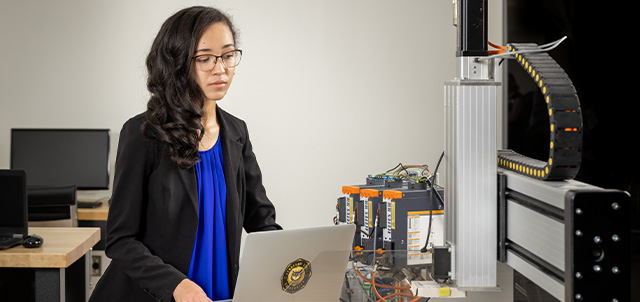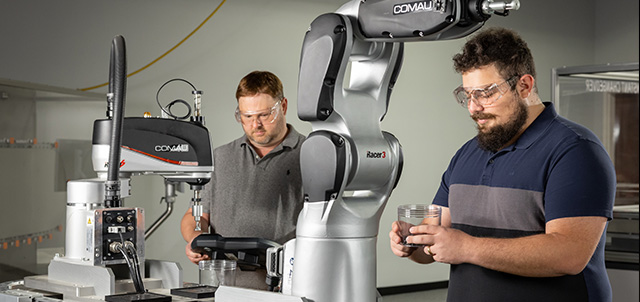The M.S. in Intelligent Robotic Systems at Kennesaw State University prepares you
for a rapidly developing field of interdisciplinary engineering by teaching theory
and techniques from Intelligent Systems and Robotics. You’ll learn to design innovative
machines with self-autonomy in this robotics degree that can be completed either in
person or 100% online.
This program teaches you industry-leading topics such as control of autonomous robotic
arms, simulations, the Robot Operating System (ROS), machine learning, and computer
vision. By focusing on robotic systems integration, this degree meets the educational
and operational needs of the next generation of Intelligent Robotic Systems Engineers.
The focus of this program is on systems by emphasizing a broader approach to the integration
of Robotics with Intelligent Systems rather than a specific concentration in one discipline.
This systems-level focus allows all graduated STEM students to apply to the program
without having a Robotics or Intelligent Systems background.
By keeping up to date with the latest technological advancements in the field of robotics,
you’ll gain access to top job opportunities in multiple engineering careers. With
the M.S. in Intelligent Robotic Systems degree, you will take courses that expand
your knowledge past the classic robotics paradigm of sense-think-act to include communication.
You’ll work to provide innovative solutions for modern-day engineering fields.
-
Major Program Elements
- Either face-to-face or 100% online program format
- Program completion possible in 12 months
- Program will teach you to design intelligent robotic systems for multi-disciplined industries
- Courses focus on topics like perception, intelligence, control, and communication
- Operate with advanced technology such as the Robot Operating System (ROS), emphasizing robotic systems integration
- GRE can be waived in some cases
- All STEM undergraduates can apply, regardless of robotics background
- More information...
-
Value of KSU Program
Selecting the right engineering Master’s program is vital to your success. Here’s why you should choose the M.S. in Intelligent Robotic Systems at Kennesaw State University.
In our program, you’ll learn to:- Apply mathematics to advanced robotics-engineering-related industry problems.
- Design and perform simulations to analyze and interpret the results.
- Identify, formulate, and solve advanced robotics engineering problems.
- Focus on robotic systems integrations through various platforms of communication.
- Operate and interpret the Robot Operating System (ROS).
- Design intelligent robotic systems for autonomous AI, biomechanical, automation, and manufacturing industries.
- Engage in targeted, interdisciplinary research and development techniques.
- Address socioeconomic issues and recognize the need for life-long learning advancement opportunities using advanced engineering principles.
- Collaborate in a diverse work environment for a real-world experience.
- Control autonomous robotic arms, simulations, the ROS, machine learning, and computer vision.
- Engage in coursework including Advanced Robotics Programming, Robot Simulation, and Communications.
-
Curriculum
Required Courses (27 Credit Hours)
- CS 7267:Machine Learning
- CS 7367:Machine Vision
- MTRE 6000: Fundamentals of Control Systems
- MTRE 6100:Advanced Robot Programming
- MTRE 6200:Modeling and Control of Robotic Manipulators
- MTRE 6300:Robot Simulation, Communications, and ROS
- MTRE 6400:Perception, Navigation, and Path Planning of Mobile Robots
- MTRE 6720:Digital Manufacturing and Robotic Automation
- MTRE 6740:Soft Robotics
Elective Course (3 Credit Hours)
Select one 3-credit hour course from the following:
Program Total (30 Credit Hours)
-
Program Eligibility
Applicants to the M.S. in Intelligent Robotic Systems program must meet the following minimum requirements to be admitted:
- An earned Bachelor of Science degree from a regionally accredited college or university
in science, technology, engineering, or mathematics (STEM).
- Students who hold degrees other than STEM degrees may, on a case-by-case basis, be required to take some transitional courses to be accepted.
- An undergraduate GPA of 3.0 or greater.
- (If the undergraduate GPA is less than 3.0, some additional coursework may be required, and the graduate program committee may need to approve the application based on individual evaluation.)
- At least two letters of recommendation (professional and academic) are required if the undergraduate GPA is less than 3.0 or the minimum GRE scores are not met.
- An earned Bachelor of Science degree from a regionally accredited college or university
in science, technology, engineering, or mathematics (STEM).
-
Admission Requirements
- An earned Bachelor of Science degree from a regionally accredited college or university in science, technology, engineering, or mathematics (STEM).
- If an applicant's bachelor's degree is not in a STEM major, he/she will be evaluated on a case-by-case basis.
- An undergraduate GPA of 3.0 or greater (on the 4.0 scale).
- If the undergraduate GPA is less than 3.0 and greater than 2.75, applicants may be
considered if they meet ANY of the following:
- A minimum of 4 years' relevant work experience in the field of engineering after their undergraduate degree. You must supply at least two (2) recommendations from former or current employers/supervisors. The letters of recommendation must clearly state your years of employment and relevant work experience.
- Successful completion of the Fundamentals of Engineering exam.
- Official GRE scores meeting the current admission profile: a Verbal score of 150 (450 on old scale) and a Quantitative score of 148.
Please note: Applicants who meet the minimum requirements are not guaranteed admission.
-
Requirements for International Students
A minimum TOEFL or CEFR score is required for international students.
- For TOEFL: A Computer-Based composite score of 213 and an Internet-Based composite score of 80
- For CEFR: a minimum of B2 level
For English information regarding a proficiency-exam waiver, please click here
International students should consult the Graduate Admissions website for additional requirements
Application Deadlines
-
Fall semester: July 1
-
Spring semester: November 1
-
Summer semester: April 1
** Note that all completed applications and required credentials must be submitted by the deadline date**
** If an applicant has never taken an undergraduate course in control systems (such as PID or State Space Control), it is recommended that they start the program in the fall or spring semester**
Apply NowFor More Information:
Dr. Matt Marshall
Program Coordinator
(470) 578-5135
msrobotics@kennesaw.edu


Special thanks to B&R Industrial Automation for providing locations for photos used on this page.













